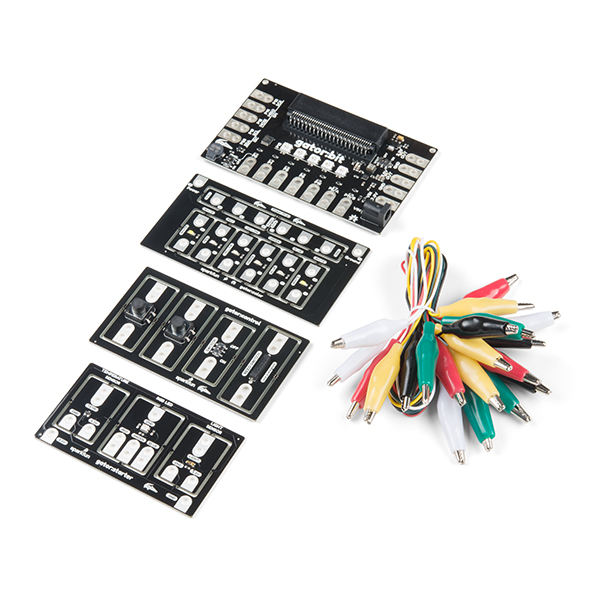SparkFun gator:circuit Kit for micro:bit
As part of SparkFun's gator:bit series of alligator-clippable accessories, the SparkFun gator:circuit Kit includes all of the current ProtoSnap gator:boards and offers a handful of ways to interact with projects you create using only gator-clip cables. Each little board on this ProtoSnap can be kept as a whole while on the board or broken apart for individual use! It includes three ProtoSnap micro:bit accessory boards along with the gator:bit; an all-in-one “carrier” board for your micro:bit that provides you with a fully functional development and prototyping platform. This kit is recommended for all users, from beginners to engineers and does not require any soldering at all!
Inside this kit, you will find a gator:control protoSnap, gator:color ProtoSnap, and gator:starter ProtoSnap. The gator:control ProtoSnap contains four boards in the main assembly including two buttons, an on/off slide switch and a reed switch. The gator:color ProtoSnap includes the following LED's: two white boards, a red board, green board, blue board, a yellow board, and a power rail. The gator:starter ProtoSnap includes a temperature sensor board, a light sensor board, and an RGB LED board. Additionally, we've also included a SparkFun gator:bit v2.0, and 10 pack of alligator cables.
The micro:bit is a pocket-sized computer that lets you get creative with digital technology. Between the micro:bit and our shield-like bit boards you can do almost anything while coding, customizing and controlling your micro:bit from almost anywhere! You can use your micro:bit for all sorts of unique creations, from robots to musical instruments and more. At half the size of a credit card, this versatile board has vast potential!
Note: The SparkFun gator:bit does NOT include a micro:bit board. The micro:bit will need to be purchased separately.
SparkFun gator:circuit Kit for micro:bit Product Help and Resources
Getting Started with the micro:bit
September 2, 2021
The BBC micro:bit is a compact, powerful programming tool that requires no software installation. Read on to learn how to use it YOUR way!
Getting Started with MicroPython and the SparkFun Inventor's Kit for micro:bit
July 11, 2017
Learn MicroPython with the micro:bit.
Gator:starter ProtoSnap Hookup Guide
October 18, 2018
Get started clipping sensors and lights to the micro:bit with the gator:starter gator:board from SparkFun!
Gator:color ProtoSnap Hookup Guide
October 18, 2018
Clip some LED's onto your gator:bit with the gator:color.
Gator:control ProtoSnap Hookup Guide
October 17, 2018
Buttons and switches and inputs oh my! Start adding more control to your gator:bit with the SparkFun gator:control.
SparkFun gator:bit v2 Hookup Guide
January 31, 2019
The gator:bit v2 is a breakout board for the BBC micro:bit. The gator:bit exposes almost every pin on the micro:bit to clippable pad with circuit protection. It also has as built-in addressable LEDs and a built-in buzzer.
How to Create a MakeCode Package for Micro:Bit
April 16, 2019
Learn how to develop code blocks for the Micro:bit in Microsoft MakeCode!
Core Skill: Programming
If a board needs code or communicates somehow, you're going to need to know how to program or interface with it. The programming skill is all about communication and code.
Skill Level: Rookie - You will need a better fundamental understand of what code is, and how it works. You will be using beginner-level software and development tools like Arduino. You will be dealing directly with code, but numerous examples and libraries are available. Sensors or shields will communicate with serial or TTL.
See all skill levels
Core Skill: Electrical Prototyping
If it requires power, you need to know how much, what all the pins do, and how to hook it up. You may need to reference datasheets, schematics, and know the ins and outs of electronics.
Skill Level: Rookie - You may be required to know a bit more about the component, such as orientation, or how to hook it up, in addition to power requirements. You will need to understand polarized components.
See all skill levels
Comments
Looking for answers to technical questions?
We welcome your comments and suggestions below. However, if you are looking for solutions to technical questions please see our Technical Assistance page.
Customer Reviews
No reviews yet.

